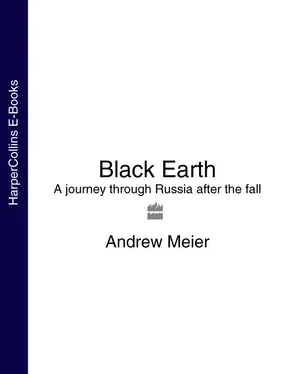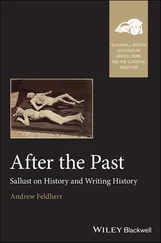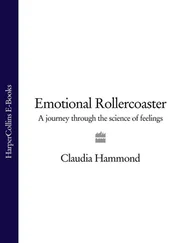IN 1990S MOSCOW the remnants of the Soviet intelligentsia liked to talk about expiating guilt. The villains of Soviet power, the forlorn and graying dissidents liked to say, needed their own Nuremberg. They knew there never would be one. Russians have not embraced any attempt at a Vergangenheitsbewältigung , what Germans, true professionals in matters of national repentance, call the process of coming to terms with the past. It is said to be cathartic, offering a kind of deliverance. Russian has no such word. 11In Russia, no attempt on a social scale has been made to examine the totalitarian past, to learn not simply how the Soviet state functioned but how Russians themselves formed that state, to concede the crimes of the past.
One afternoon I stopped by a roundtable discussion held by several former KGB chiefs. Vladimir Kryuchkov, the true believer who had run the Lubyanka under Gorbachev until he turned against him in the coup of August 1991, went blank when a reporter, a Russian woman in her twenties, asked his opinion of the virtues of repentance. “What is there to repent?” Kryuchkov replied. He seemed more puzzled than angered. “We have nothing to regret; we only tried to save the Union. It’s those who unleashed the present chaos who should think about repentance.” History, I feared, had made a stunning return, only to be forgotten just as quickly.
IN SEARCH OF LEVITY in matters of remembrance, I learned to seek the gentle counsel of Semyon Samuelovich Vilensky. Semyon was in his early seventies when we first met, but his handshake, I was reminded each time I entered his two-room apartment on Moscow’s northwestern edge, remained a nutcracker. A short, stocky man with a white curly mane, Semyon had bushy white brows and soft blue eyes that flashed when he smiled. His face, expressive and animated, invariably reminded visitors of Einstein.
Semyon established the ritual of our visits: first tea, strong tea; then a beloved cigarette; lastly crackers or cake, whatever the kitchen held. Only then did we get down to business. The apartment seemed sparse, but it was crowded. The wall of cabinets in the living room was filled with manuscripts. For more than four decades he had collected the works-memoirs, short stories, poems, plays, novels, diaries-of the zeks, the prisoners who suffered in Stalin’s labor camps. “Zek” was camp slang, a word that grew out of the Gulag architects’ bureaucratic shorthand; z/k stood for zaklyuchennyi , a prisoner.
By now Semyon had thousands of manuscripts. It was a miracle they had survived. With a wide grin, Semyon liked to share his secret. “The babushkas,” he said. The grannies. “It’s all thanks to the babushkas.” For twenty-five years, from Khrushchev to Gorbachev, he traveled the country. He spent six months in Moscow, six months on the road. He was not wandering, though he said the warmth of rural Russia saved him. He was slowly, quietly saving the literary heritage of the camps.
“In those days where could you keep manuscripts written by zeks? Only in villages, far from Moscow, in the hands of old ladies. So I’d take to the roads of the countryside and walk. I’d go from village to village. And the babushkas took me in, and without fear or doubt, they took the manuscripts and hid them.”
He did not think his archive a great achievement. “Camp survivors like to write,” he said. “And by now their relatives know I will take anything and lose nothing.” Moreover, he was not happy merely to have rescued the manuscripts. He had vowed to put them into print. In the late 1980s, once glasnost began to free Moscow’s printing presses, Semyon started to reel in his scattered manuscripts. In 1989 he founded a group known as Vozvrashchenie (The Return), and although he was the sole full-time staffer, began steadily to publish the manuscripts. In 1990 he got a copying machine, a gift from George Soros. By 2001 he had published more than fifty volumes, but the copier remained his primary press. For a decade a repairman had fixed it gratis. “His father,” he joked, “must have been in the camps.”
Semyon of course was a survivor himself He served on the Kremlin’s Rehabilitation Commission, a body established by Yeltsin and chaired by Aleksandr Yakovlev, Gorbachev’s former ideologist, that attempted to restore the good names of the victims of Stalinism. He was the commission’s sole Gulag veteran. He did not, however, like to speak of his own experience. Only bit by bit did I piece it together. He had been arrested just after his twentieth birthday–“For poetry,” he said. It was in 1948. He had been an eager student of literature at Moscow State, and he had done a stupid thing. He recited one of his poems to a circle of friends. One of his lines–“Agents surround us and the first among them is Stalin” – caught the ears of an informer. He was accused of “anti-Soviet agitation” and “terrorist intentions” and jailed first in the Lubyanka, then in a transit prison before being sent off to the dreaded mines of the Kolyma camps in the Far East. As Zek No. I-1620 he spent more than six years in Kolyma.
In 1955 Semyon got out. In 1962 he tried to get his first anthology of camp literature published – by the Kolyma regional government. “It would have been an important beginning,” he said. He even secured a story from Varlam Shalamov, the camp survivor whose Kolyma Tales had earned Solzhenitsyn’s envy. The book was typeset in 1963, but “at the last minute Moscow ordered all writers not officially residing in Kolyma excluded.” They printed a collection of Kolyma works, but not any by camp writers, many of whom lay buried in the local cemeteries. Semyon vowed to right that wrong, a vow he had spent the next quarter of a century fighting to fulfill.
Tea at Semyon’s lasted for hours. He took his time. His anarchic brows danced, his hands flew through the smoky air. As he braided old stories for a new audience, a smile coiled up and flashed. His conversation sounded Socratic, his tales almost rabbinical. He liked to end his discourses with a moral. He dispensed them like benedictions. But he always arrived at the same destination, the tragic conclusion that these first years after the Soviet fall were no exception. Russians had never come to terms with their past. “We barely had enough time to ask the right questions,” he said, “let alone try to answer them.”
“I JUST FLEW IN from Seoul,” announced the voice on the phone, waking me at 4:17 A.M. “And from the height of thirty-five thousand feet, it suddenly made sense: This place was not intended for habitation.” I hung up and soon fell back into a deep sleep. In the morning it seemed like a dream. But I knew who had called.
Viktor Pelevin, whom by then I had helped label “the voice of the new generation,” had grown into a friend. Since the fall of the USSR, Russians have bemoaned the flood of pulp fiction as how-to manuals on everything from the Internet to the Kama Sutra filled their bookstores. But just as Moscow critics were ready to pronounce Russian literature dead, Pelevin came of age. His modern satires, laced with ontological meditations and wild flights of a psychedelic imagination, soared to the top of the best-seller lists. By his early thirties Pelevin had become the literary celebrity of the post-Soviet generation.
With a degree from the Moscow Institute of Power Engineering and a passion for Zen Buddhism, he did not seem the top candidate for the title. But in 1993 his first book of stories, The Blue Lantern , won an immediate audience and Russia’s “Little Booker” prize. His first novel, Omon Ra , won high praise. Moscow’s critics, never particularly cordial to newcomers, hailed it as the first landmark of post-Soviet literature. Ever since, Pelevin has proved spectacularly prolific, cranking out roughly a novel a year.
Читать дальше












